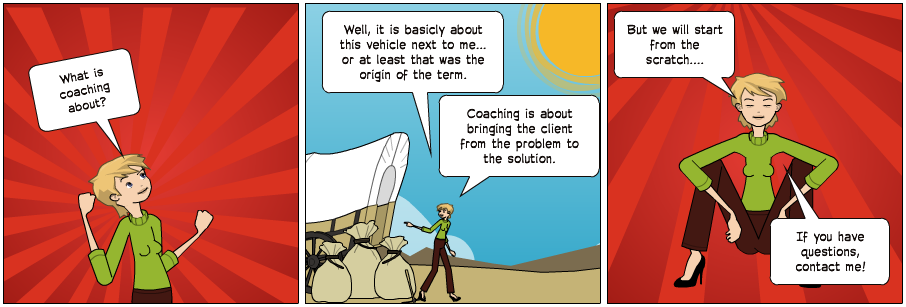Welcome to week one of the Peer Coaching (M)OOC!
In this week we will have a short introduction into coaching in general. Peer coaching is a way of group coaching between colleagues. The activities for this week are all asynchronous and can be done time- and location-independent as it fits to your time-schedule.
You are free to comment on anything that comes to your mind in the comment section below, post in the TalkReflection Forum or email me directly if your have questions or concerns. A lot of the content is open content from the web. For further peer coaching OOCs own material is planned to be produced.
We will start from the scratch, so there is no need of prerequisites.
Looking forward to building up our first EmployID peer coaching group with you!

Week 1 Activities
Asynchronous activities
Synchronous event
- No synchronous event this week!
Tasks
Essential
- read through the material (see asynchronous activities)
- find examples for e-coaching you would like to share with the group (either in Google Drive, via twitter using #intervisionOOC or as a comment below)
- Give feedback on this weeks material!
Useful
- to receive current news on e-coaching sign up for Stella Kanatouri’s Blog on E-Coaching in LinkedIn, wordpress or simply view it monthly
- view EmployID Glossary on Coaching, E-Coaching, Intervision and Self-Coaching, if you are a member of EmployID Consortium
Resources
These are all the resources used for the content of week 1.
Ajdukovic, Marina; Cajvert, Lilja; Judy, Michaela; Knopf, Wolfgang; Kuhn, Hubert; Madai, Krisztina & Voogd, Mieke (2014). ECVision. A European Glossary of Supervision and Coaching. Retrieved from http://www.anse.eu/ecvision.html (14.08.2014)
Bimrose, Jenny; Brown, Alan; Holocher-Ertl, Teresa; Kieslinger, Barbara; Kunzmann, Christine; Prilla, Michael; Schmidt, Andreas P. & Wolf, Carmen (2014). Introducing learning innovation in public employment services. What role can facilitation play? In: Proceedings of International Conference on E-Learning at the Workplace (ICELW) 2014, New York City, USA, June 11-13, 2014 Retrieved from http://www.icelw.org/program/ICELW%202014%20Proceedings/start.html
Dietz, Thomas & Müller, Gabriele (2012). 1.4 Coaching Services. Deutscher Bundesverband Coaching e.V. (German Federal Association for Excecutive Coaching) (Publisher). Guidelines and Recommendations on the Development of Coaching as a Profession. A Compendium Including the Professional Standards of the DBVC. Osnabrück: Steinbacher Druck. Retrieved from: http://www.dbvc.de/fileadmin/user_upload/dokumente/Coaching-Kompendium/DBVC-Kompendium_englisch.pdf (17.04.2014) pp. 29-33
Gluck, M.A., Mercado, E., & Myers, C.E. (2010). Lernen und Gedächtnis Vom Gehirn zum Verhalten. Heidelberg: Spektrum Akademischer Verlag
International Coaching Federation (ICF) (2008, December 18). Code of Ethics. Retrieved from http://www.coachfederation.org/about/ethics.aspx?ItemNumber=854&navItemNumber=634
Kanatouri, Stella (2014). E-Coaching: A Knowledge Base. (http://ecoachingbase.wordpress.com/)
Lippmann, Eric (2013). Coaching. Angewandte Psychologie für die Beratungspraxis. Berlin/ Heidelberg: Springer Verlag.
RSA Animate (2010, May 24). Philipp Zimbardo: The Secret Powers of Time. [Video File] Retrieved from https://www.youtube.com/watch?v=A3oIiH7BLmg (YouTube)
Schmidt, Gunter (2012). Liebesaffären zwischen Problem und Lösung – Hypnosystemisches Arbeiten in schwierigen Kontexten. Heidelberg: Carl-Auer Verlag
Patrick Schriel. Coaching & Training. Retrieved from http://patrickschriel.com/ (14.08.2014)
SmithLeadershipLLC (2012, July 17). What is Coaching? [Video file]. Retrieved from https://www.youtube.com/watch?v=nFx6yKZrzco (YouTube).
Weiß, Josef (1991). Selbst-Coaching. Persönliche Power und Kompetenz gewinnen. Paderborn: Junfermann Verlag
Wolf, Carmen (2014; in prep.). The Trouble with Systemic Solution-oriented Self E-Coaching – Emotions as a key factor in changing patterns. Upcoming Workshop Proceedings of MATEL 2014